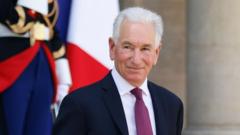Colonel Susannah Meyers has been dismissed from her post as commander of the US military base in Greenland, known as Pituffik Space Base, following her decision to distance herself from recent comments made by Vice-President JD Vance regarding Denmark's handling of security in Greenland. The US military's Space Operations Command announced her removal due to a "loss of confidence in her ability to lead."
During a visit to Greenland last month, Vance criticized Denmark—Greenland's governing nation—for insufficient investment in the Arctic region's security, suggesting they had "not done a good job" for the local populace. In an email to base personnel, Meyers reportedly indicated that Vance's statements did not represent the views of the Pituffik Space Base community.
The email, which has been confirmed as authentic by Military.com, revealed that Meyers expressed a degree of uncertainty about current political issues while stating, "the concerns of the US administration discussed by Vice-President Vance... are not reflective of Pituffik Space Base." Her comments were perceived by the Pentagon as undermining the chain of command.
In a tweet, Pentagon spokesperson Sean Parnell underscored the seriousness of the issue, insisting that actions undermining chain of command or subverting the agenda of the administration would not be tolerated. Following Meyers' dismissal, Colonel Shawn Lee was appointed as her replacement.
Vance's visit was accompanied by contentious discussions about US interest in Greenland, including reaffirmations of former President Trump's intentions to explore the possibility of annexing the territory for security purposes. Both Denmark and Greenland have expressed a unified rejection of US annexation plans, with Danish Prime Minister Mette Frederiksen reinforcing that other countries cannot be annexed.
Senior political leaders in Greenland have shown a normative desire for independence from Danish rule, without an inclination to align with US governance. While Greenland has been under Danish control for nearly 300 years, recent polls highlight a growing support for independence, albeit with apprehension towards a transition to US governance.




















